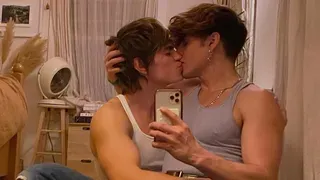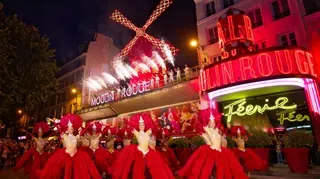December 18, 2024
EDGE Interview: Liberty Styles on Liberating Tap in ART's 'Diary of a Tap Dancer'
Kilian Melloy READ TIME: 8 MIN.
Watch this rehearsal video of "Diary of a Tap Dancer"
EDGE: You mean in this production specifically, or tap in general?
Liberty Styles: In this particular production there's a lot of fluidity in terms of what role we're taking in any given scene. We're not necessarily particular characters. We are in some senses, but we're really flowing in the story to create how we're there for the storytelling. We're embodying different characters, and some of them are very masculine, while some of them are more feminine. That's fun for me.
EDGE: Is this a biography of Ayodele Casel, as the title suggests, or is it more an illustration of themes that Ayodele wants to examine in the work?
Liberty Styles: I think both. She's telling her story, and as the play progresses it becomes a vehicle for other themes, illustrating some experiences that are shared among women dancers of color. There's a lot of different points that are made and stories that are told. She's reclaiming her narrative, and within the story, as it goes into her career as a tap dancer, that's where we, as actors, are able to bring in our own stories. It also touches a lot on the history of women who were overlooked and queer people who were overlooked, including non-binary and trans people.
It's got a lot of layers, like an onion. The more it goes along, the more it unfurls in terms of whose story it is. It starts in [the biographical] format, and then it kaleidoscopes. But the theme is very much about honoring people who may not have gotten their flowers when they were alive, and narrative justice around who gets to tell their stories. It touches on why things are erased, lost in history. It's pretty deep, and it's also got tap dance in it, so it's really fun and very vibrant, and gives people who maybe don't know about tap dance culture a look into what those experiences are like behind the stage. It gives a little more context, which is cool because I think this is enabling people to see tap dancers in a more holistic way, and the story really is about tap. I've never been part of a production like that, so I've been enjoying the vibe.
EDGE: Tap dance used to be something people would see a lot in the movies, and maybe on stage as well, but now it seems like you don't see it or hear about it as much. Do you feel like tap dance has become more of a niche or specialized art form?
Liberty Styles: Yeah, it's interesting. There's been a lot of different branches on the tree of tap, if that makes sense. You just spoke to one, which was my first reference point – like, seeing Gene Kelly in the movies. There were certain eras where there was a boom in awareness about tap, like in the movies. Also, like the Harlem Renaissance – everyone had a tap dance, and 20 themes and different movements. It's interesting how that has played out in terms of who gets to be seen.
Just to bring it back to what this role is really about, when things went into the movies, it was harder for Black folks to be seen in the movies. There was a lot of whitewashing that came with the commercialization in the movie industry, in the TV industry. And now there's people dancing in music videos and TV; it still shows up in the movies, sometimes. But there's also quite a bit of musical theater; there's a whole branch of dancers who maybe are more aligned with musicians that have been playing more with jazz bands or other bands, and there are dance companies, as well. There's dance concert, where a lot of people have made a living in a dance company in that format. So, there's a lot of stuff, but I think in a lot of ways tap has always been something where it requires some entrepreneurship, because you've got to get yourself in there. It's carving the space that you take up. Maybe that makes it a bit niche.
This production is interesting for me, because it's not the first thing I think of when I think of musical theater. It's not quite that. I don't really know how to categorize it, but bringing it into the theater is something that excites me, and it feels like it opens up possibilities. It's challenging me in all the right ways.
I think it's an exciting time for tap. There's a little bit more freedom than in the past, since the pandemic, maybe, around people owning their own stories a bit more. What Ayodele is doing is really interesting and pushing the sorts of the possibilities for what, where, and how tap can fit into a story. We'll see what happens from here. I hope it can grow even more as a whole.
"Diary of a Tap Dancer" continues at the A.R.T. in Harvard Square through Jan. 4. For tickets and more information, follow this link.
Kilian Melloy serves as EDGE Media Network's Associate Arts Editor and Staff Contributor. His professional memberships include the National Lesbian & Gay Journalists Association, the Boston Online Film Critics Association, The Gay and Lesbian Entertainment Critics Association, and the Boston Theater Critics Association's Elliot Norton Awards Committee.







